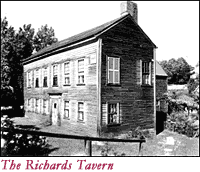Samuel Haws on the Second Day of the War
Yesterday we left Samuel Haws and his fellow Wrentham minutemen at Nathaniel Richards’s tavern in west Roxbury on the evening of 19 Apr 1775. They had come across two men, one of them a neighbor from Wrentham named Ebenezer Aldis—who was from a family suspected of Loyalist sympathies.
Another version of this event, perhaps juiced up for or by Richards descendants, said the tavernkeeper’s son-in-law had seized a prisoner for trying to interfere with the militia alarm. And that the companies coming through that town wanted to hang him.
Here’s how Haws described what happened:
For the next day, Haws’s diary turns to action, or potential action:
Haws then settled into the life of a soldier in a siege:
COMING UP: The Aldis brothers.
Another version of this event, perhaps juiced up for or by Richards descendants, said the tavernkeeper’s son-in-law had seized a prisoner for trying to interfere with the militia alarm. And that the companies coming through that town wanted to hang him.
Here’s how Haws described what happened:
we marched to [Nathaniel] richardes [in west Roxbury] and Searched the house and found Ebenezer aldis and one pery who we supposed to Be torys and we searched them and found Several Letters about them which they were a going to cary to Nathan aldis in Boston but makeing them promis reformation We let them go homeThe Richards family tradition gave credit to the landlord and his son-in-law, Solomon Richards, for preventing a lynching:
In the meantime a body of soldiers arrived, and demanded the tory, that they might hang him during their halt. But Capt. R. and his father-in-law resisted their demands, insisted on giving the man a trial, and through their wellknown patriotism, prevailed, and saved the man from the gallows, but not from 39 lashes, ordered by a court.It’s of course possible that both these stories are true but refer to different captives. However, it appears that Haws and his company spent the night around Richards’s tavern, and he didn’t record any trial and punishment, however perfunctory. Therefore, I think it most likely his story is the reliable one.
For the next day, Haws’s diary turns to action, or potential action:
then marching forward we met colonel [John] graton [of Roxbury] returning from the engagement which was the Day before and he Said that he would be with us amediately then we marched to Jamicai plain their we heard that the regulars Were a coming over the neck. Then we striped of our coats and marched on with good courage to Colonel [Joseph] Williams and their we heard to the contrary.In The Road to Concord I suggest that Joseph Williams (shown above), a big Roxbury farmer with family links to William Dawes, was a link in smuggling Boston’s militia cannon out of town sometime in early 1775. The British army expedition to Concord on 18-19 April was aimed at finding those cannon. So having militiamen on his farm brought everything full circle.
Haws then settled into the life of a soldier in a siege:
We staid their some time and refreshed our Selves and then marched to Roxbury parade and their we had as much Liquor as we wanted and every man drawd three Biscuit which were taken from the regulars the day before which were hard enough for flintsI like how Haws switched from recounting the start of a momentous civil war to looking for anything “remarkable,” “Strange,” or “comical” to write down.
We lay on our arms until towards night and then we repaired to Mr. [John] Slaks house and at night Six men were draughted out for the main guard.
D. 21. Nothing remarkable this day.
D. 22. Nothing Strange this D nor comical.
COMING UP: The Aldis brothers.


